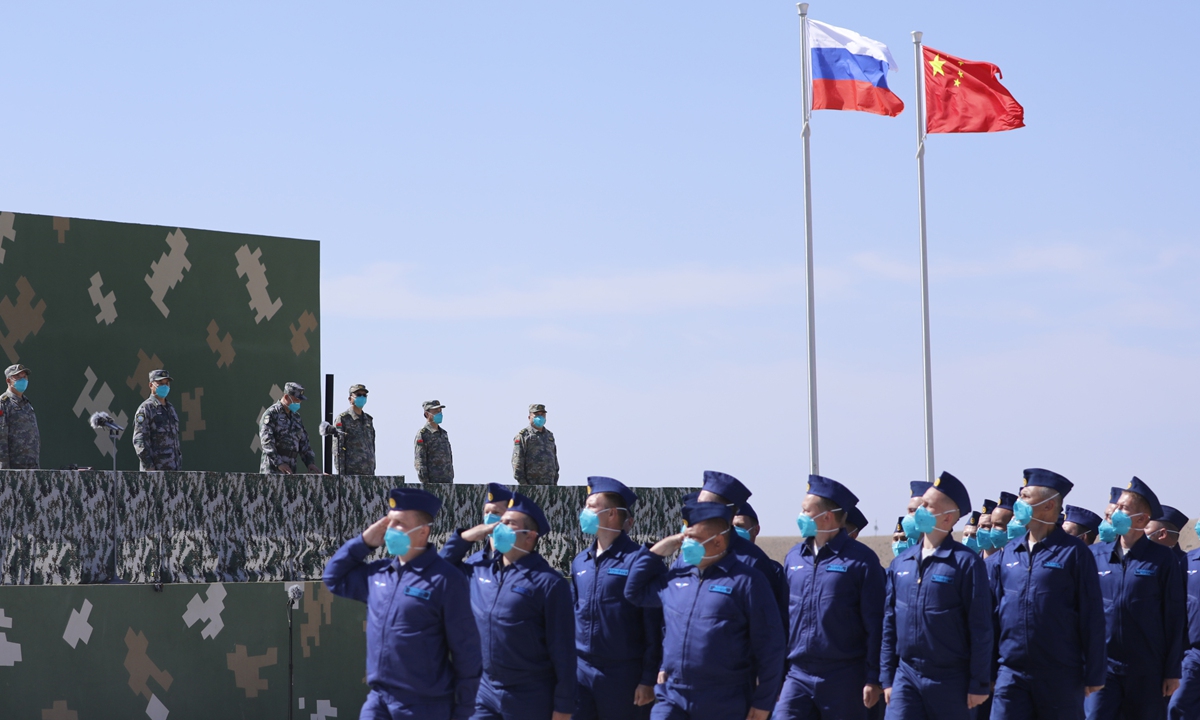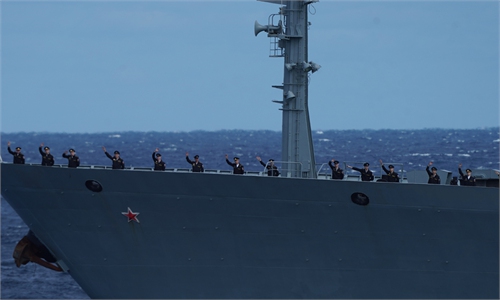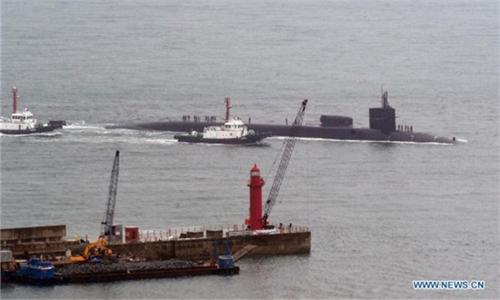US is very concerned and they are not used to lagging behind: retired Russian military official

Russian Air Force soldiers pass the grandstand at the opening ceremony of a China-Russia large-scale strategic military exercise on Monday in Northwest China's Ningxia Hui Autonomous Region. Photo: Xinhua
Editor's Note:Recently, the US has ramped up its hype over the so-called China threat. These messages range from the hypersonic weapons to the situation across the Taiwan Straits. Washington has exaggerated the threat from Moscow as well. Why does Washington sensationalize the threat from Beijing and Moscow? How should one evaluate recent US provocations that are escalating the situation across the Taiwan Straits? Evgeny Buzhinsky (Buzhinsky), retired Russian lieutenant-general and chairman of the Executive Board of Russia's PIR Center, shared his insight on these issues with Global Times (GT) reporter Lu Yuanzhi.
GT: The US military has hyped up the development of hypersonic weapons by China and Russia. It exploits this as an excuse to develop related weapon systems. What's your take on the US military's exaggeration about the threat from China and Russia?
Buzhinsky: Actually, the US is lagging behind Russia and China in this race. Hypersonic weapons are actually a weapon which cannot be repulsed at the moment. The US does not have any systems which can either intercept or repulse a strike, especially if it's a missile. But even without nuclear warhead, it's a very mighty weapon, especially at sea.
The US is very concerned. By the way, they started their hypersonic weapons long before Russia and China. But somehow they found themselves in this very peculiar position of lagging behind. They are not used to lagging behind, but with more and more evidence, they found themselves to be far behind Russia and China.
GT: By virtue of hyping up issues of hypersonic weapons, the US also sensationalizes that China's nuclear deterrence has exceeded Russia. As a professional, what do you think of the US' such attempt to sow discord between China and Russia?
Buzhinsky: I don't think that it's an attempt to sow discord between Russia and China. I think that they are overestimating the situation. The number of China's nuclear warheads is less than that of the United States and Russia.
However, the US is afraid of China's financial, industrial, technological resources. If there is a need or wish, you can out number US and Russia. So they are thinking about the future, not about the present.
GT: Chinese and Russian warships held their first joint patrols in the western Pacific Ocean in October, sailing around Japan. In your view, how will related joint actions continue and expand?
Buzhinsky: It will continue. Maybe it will expand. Last year, there was a joint patrol of strategic bombers. Now there is a maritime patrol. I think that this sort of cooperation alongside with joint exercises will not only be in Asia Pacific, but in other parts of the world. This kind of cooperation will expand.
And by the way, this kind of cooperation is actually a kind of cooperation between military allies. Even without the formal treaty of alliance, Russia and China actually conduct many forms of military cooperation, which are characteristics for real allies.
GT: In October, Russian Foreign Minister Sergey Lavrov said, "Russia, like the overwhelming majority of other countries, considers Taiwan to be part of the People's Republic of China… We have proceeded and will proceed from this premise in our foreign policy." Taiwan concerns China's core interests. What's your take on recent US provocations to escalate the situation across the Taiwan Straits?
Buzhinsky: Well, first of all, for Russia, Taiwan is an integral part of China. It's up to you how to solve this problem, but of course peacefully and diplomatically. And I'm sure that in China, you are planning not like us for 5 or 10 years, you're planning for 100 years. So I think that sooner or later, you will solve this problem. But the United States wants to exploit the Taiwan question, which is not hotbed of tension for now, but very closely.
It's like Ukraine for Russia. We face US provocations in the Black Sea. You face the US provocations in the Taiwan Straits and in the South China Sea. It's the same under the slogan of a freedom of navigation, or freedom of presence everywhere.
And we are waiting to see how it will look like in the Biden administration doctrinal documents, which will appear at the beginning of next year. But I am sure that it will be the same: China and Russia are the main adversaries of the US.
GT: What are the similarities and differences between China-Russia relations and China-Soviet Union relations? Under pressure from Washington, Beijing and Moscow are getting closer. Some describe the relationship between China and Russia as "not allies, but better than allies." How do you see the China-Russia partnership in the new era?
Buzhinsky: In the 1950s, China was the closest ally of the Soviet Union. At that time, almost all children in the Soviet Union had contacts with China. I exchanged letters with some boy in Beijing, and we sent letters to each other. That boy learned Russian. China and the Soviet Union had a treaty of a military alliance. And everything was very bright. After that, when China had its "Cultural Revolution," we had quite a decline in our relations. We actually became practically hostile nations.
Today, the presidents of Russia and China characterize our relation as a strategic partnership, which is more than formal alliance. So I think that now our relations are in a pretty good shape. I think the bilateral relations will be stable and sustainable.
Even if we formally signed the treaty over alliances, it's not a 100 percent guarantee that our relations will become stable and resilient under all external pressures. In comparison to a formal alliance, I think that a strategic partnership lacks only one element: the commitments to militarily help in case of a war. That's the only element which our relationship lacks. But it doesn't mean that if there is a need, if there is a real war, Russia will not help China, and China will not help Russia. This has not been excluded, even in the absence of the formal treaty.


